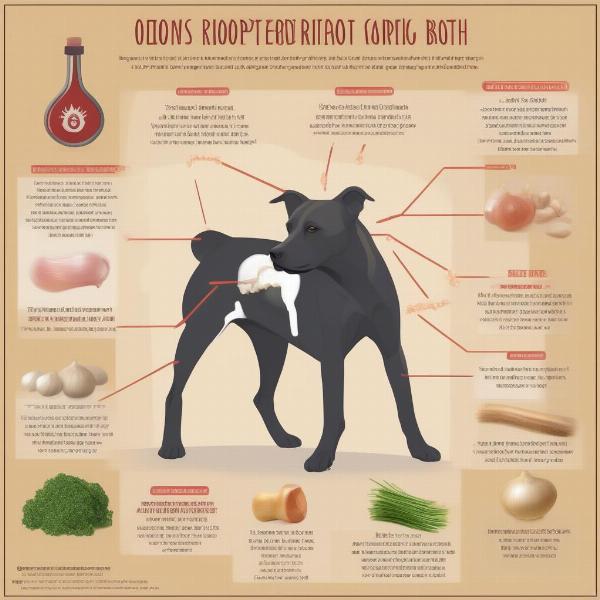Bone broth has become a popular health food for humans, but what about our canine companions? Is Brutus bone broth good for dogs? The short answer is: yes, with some important caveats. While bone broth can offer several potential benefits for dogs, it’s crucial to understand how to choose and serve it safely. This article will delve into the nutritional aspects of bone broth for dogs, highlighting the pros and cons, and providing practical guidelines for incorporating it into your dog’s diet.
Understanding the Benefits of Brutus Bone Broth for Dogs
Bone broth is a rich source of collagen, a protein essential for joint health, skin elasticity, and coat shine. As dogs age, their natural collagen production decreases, making supplementation through bone broth a potential option for supporting mobility and comfort. Furthermore, bone broth contains glucosamine and chondroitin, which are known to support cartilage health and can be beneficial for dogs with arthritis or joint issues. It also provides essential minerals like calcium, magnesium, and phosphorus, albeit in small amounts. Finally, the savory flavor of bone broth can be enticing for picky eaters and can be a helpful way to hydrate dogs, especially during illness or hot weather.
Potential Risks of Brutus Bone Broth for Dogs
While bone broth offers many potential benefits, it’s important to be aware of the potential risks. Commercially prepared bone broth for humans often contains ingredients that are toxic to dogs, such as onions, garlic, and excessive salt. Homemade bone broth also carries risks if not prepared correctly. Cooked bones, especially cooked poultry bones, can splinter and cause choking hazards or damage to the digestive tract. High sodium content can also be a concern, particularly for dogs with heart or kidney conditions. Finally, some dogs may have allergies or sensitivities to certain ingredients in bone broth, such as beef or chicken.
 Potential risks of Brutus bone broth for dogs
Potential risks of Brutus bone broth for dogs
How to Safely Give Your Dog Brutus Bone Broth
If you decide to give your dog Brutus bone broth, choose a product specifically formulated for dogs or make your own using raw bones and avoiding any potentially harmful ingredients. When making homemade bone broth, use raw, meaty bones from appropriate sources and simmer them for an extended period (24-48 hours) to extract the maximum nutrients. Always remove any cooked bones before serving the broth to your dog. Start with small amounts and monitor your dog for any adverse reactions. Consult your veterinarian before adding bone broth to your dog’s diet, especially if your dog has any underlying health conditions. Remember that bone broth should be a supplement, not a meal replacement.
Is Brutus Bone Broth Good For Dogs with Allergies?
If your dog has allergies, it’s crucial to choose a single-protein bone broth that doesn’t contain any of their known allergens. Always introduce new foods slowly and monitor for any signs of allergic reaction.
Is Brutus Bone Broth Good For Senior Dogs?
The collagen and joint-supporting nutrients in bone broth can be particularly beneficial for senior dogs experiencing age-related joint stiffness or mobility issues.
Conclusion: Adding Brutus Bone Broth to Your Dog’s Diet
Brutus bone broth can be a nutritious and flavorful addition to your dog’s diet, offering potential benefits for joint health, skin, coat, and hydration. However, it’s vital to choose and prepare it safely, avoiding potential hazards like cooked bones and harmful ingredients. Consult with your veterinarian to determine if Brutus bone broth is a suitable supplement for your dog’s individual needs and to discuss appropriate serving sizes.
FAQ
- Can I give my dog human bone broth? No, human bone broth often contains ingredients toxic to dogs.
- How much bone broth should I give my dog? Start with small amounts and consult your vet for specific recommendations.
- Can puppies have bone broth? Yes, but in moderation and after consulting with your veterinarian.
- What type of bones are best for making bone broth for dogs? Raw, meaty bones from beef, pork, or lamb.
- Can I give my dog bone broth every day? It depends on your dog’s individual needs; consult your vet.
- What are the signs of an allergic reaction to bone broth? Itching, redness, vomiting, or diarrhea.
- How should I store homemade bone broth? Refrigerate for up to 5 days or freeze for longer storage.
ILM Dog is a leading international dog website dedicated to providing reliable and practical information on all aspects of dog care and wellbeing. From breed selection and puppy care to senior dog health and training, ILM Dog offers expert advice, valuable resources, and a supportive community for dog lovers worldwide. We cover a wide range of topics including dog breeds, health, training, nutrition, grooming, and much more. Contact us at [email protected] or +44 20-3965-8624 for any inquiries.